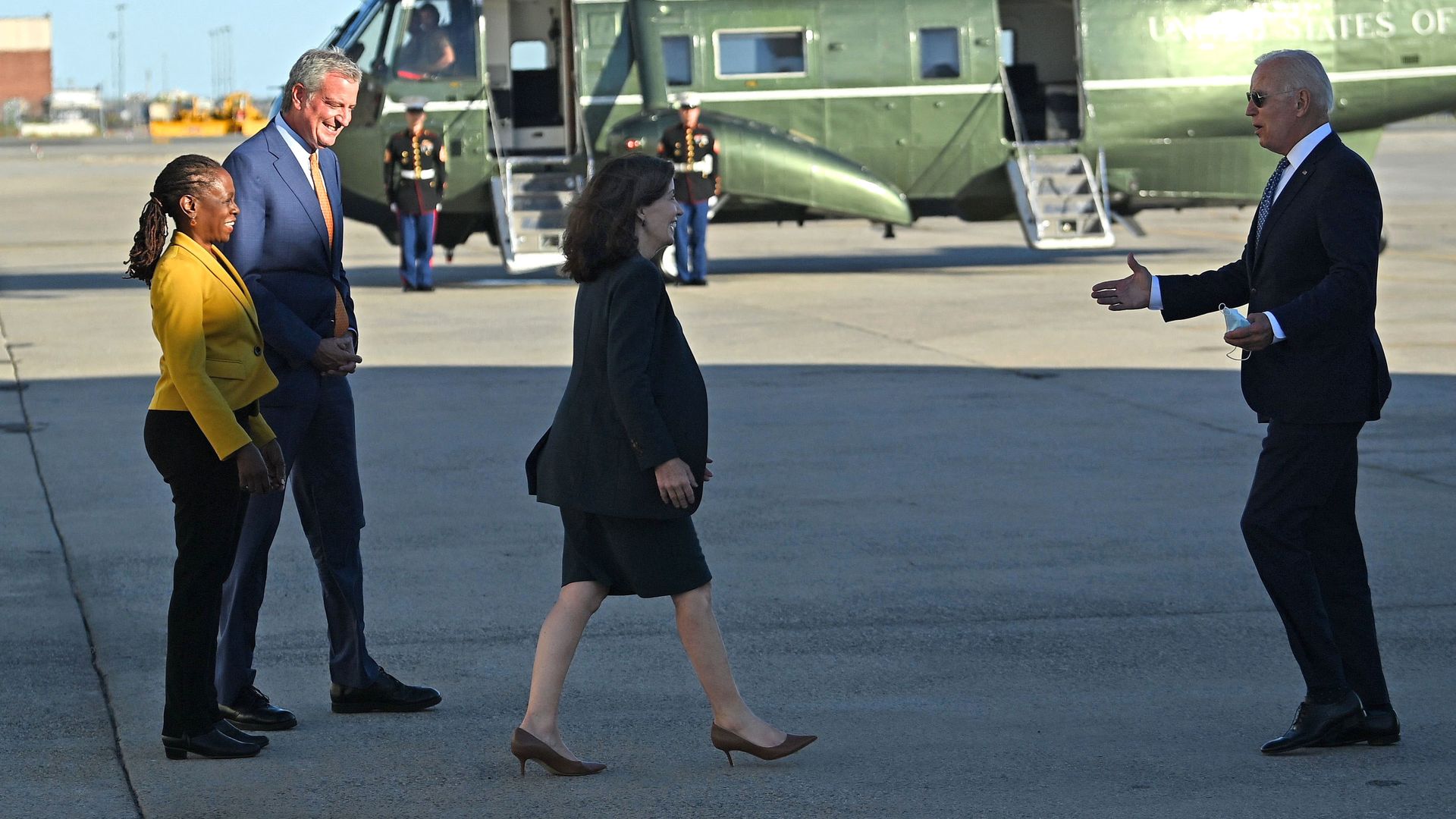| | | | | | | Presented By HCA Healthcare | | | | Axios Sneak Peek | | By the Axios Politics team ·Sep 20, 2021 | | Welcome back to Sneak. The presidential roadshow is playing New York City for a few days. Smart Brevity™ count: 1,466 words ... 5.5 minutes. Edited by Glen Johnson. | | | | | | 1 big thing: Pelosi's back-to-school math problem |  | | | Illustration: Sarah Grillo/Axios | | | | House Speaker Nancy Pelosi (D-Calif.) may need votes from an unlikely source — the Republican Party — if she hopes to pass the bipartisan infrastructure bill by next Monday, as she's promised Democratic centrists. Why it matters: With at least 20 progressives threatening to vote against the $1.2 trillion bipartisan bill, centrist members are banking on more than 10 Republicans to approve the bill, Axios' Alayna Treene and Hans Nichols report. - While Pelosi is a master at counting votes in her own party, she has less experience getting an accurate read on the Republican side of the aisle.
What we're hearing: Rep. Steve Scalise (R-La.), the House Republican whip and an opponent of advancing the bill, has been quietly counting how many Republicans are expected to vote for it. - Members returned to town today after spending most of the past seven weeks on recess, giving them a chance to have face-to-face conversations and figure out where they stand.
- Rep. Fred Upton (R-Mich.), one of the 10 House Republicans who voted to impeach Donald Trump earlier this year, also is privately taking the temperature of his GOP colleagues.
- Upton, a member of the moderate Problem Solvers Caucus, is in favor of advancing the legislation.
Pelosi's other option is to convince the 10 centrists that she needs more time to pass the concurrent $3.5 trillion budget reconciliation package. - The White House continues to coordinate its strategy with congressional leaders and is starting to engage with the centrists, with Brian Deese, director of the National Economic Council, and Louisa Terrell, the head of legislative affairs, scheduled to meet with the New Democrat Coalition tomorrow afternoon.
- The Business Roundtable also is weighing in, urging lawmakers to vote on the bipartisan infrastructure bill by Sept. 27.
- "The House should not delay in sending this bill to the president's desk," Joshua Bolten, the BRT's president and chief executive officer, said in a letter sent to lawmakers tonight.
Axios talked to a number of House Republican members and aides about how many Republicans they think would support the $1.2 trillion bipartisan bill. - Their answers ranged anywhere from roughly 20 to fewer than 10.
- Some predicted a hefty portion of the yeas would come from the 28 Republicans in the Problem Solvers Caucus.
- Those expecting a lower number said few Republicans will ultimately buck leadership, since Rep. Kevin McCarthy (R-Calif.), the House minority leader, joins Scalise in opposing the bill.
Keep reading. |     | | | | | | 2. Biden's communications headaches |  | | | President Biden stands with British Prime Minister Boris Johnson and French President Emmanuel Macron at the G7 summit in June. Photo: Patrick Semansky/Pool/AFP via Getty Images | | | | Boris Johnson told reporters on his way to the U.N. General Assembly Sunday night he didn't believe it was likely that the U.S. would agree to lift its ban on vaccinated foreign travelers this week. Hours later, the White House did exactly that. Why it matters: For the second time in less than a week, a major U.S. foreign policy decision by the Biden administration appears to have caught one of its closest allies by surprise. And neither was the first time, either, writes Axios' Zachary Basu. - "Yes, we have done it faster than we expected," the British prime minister acknowledged when pressed later by a reporter about why he was out of the loop on the pending U.S. announcement, which will go into effect in November.
- A senior Biden administration official told Axios the British government was "absolutely" informed ahead of the announcement.
- The official pointed to a U.S.-U.K. joint task force that had been working on restarting travel between the two countries since the G7.
France was already angry about being surprised when the administration scuttled its massive submarine contract with Australia as part of a new security U.S./U.K./Australia security agreement. - The French are showing no signs of easing up on reprisals after top French officials said they first learned of the deal through the media.
- Secretary of State Antony Blinken said last week that France was aware of the AUKUS deal before the announcement, but that appears only to be true by a matter of hours.
It's also déjà vu for the European Union, which was blindsided when the White House announced in May that it would waive certain patent protections for COVID-19 vaccines. - And Ukrainian President Volodymyr Zelensky said in June he had to listen to a White House press briefing to get an explanation for why President Biden decided to stop trying to block construction of Russia's Nord Stream 2 pipeline, which Ukraine views as a dire national security threat.
- In several of these cases, media leaks — including to Axios, in the case of Ukraine — were to blame for allies learning about key decisions from someone other than their American counterparts.
The big picture: Biden will use his address before UNGA tomorrow to herald a new chapter of "intensive diplomacy" to confront the challenges of the 21st century. But he will do so while facing a serious credibility test. - The president's decisions on the Afghanistan withdrawal and AUKUS showed "a clear lack of transparency and loyalty, loyalty and loyalty," EU Council President Charles Michel told reporters on Monday.
- "I'm not putting in question this alliance," Michel said. "But I'm asking, is there a doubt in the United States about the importance of this alliance with Europe?"
|     | | | | | | 3. By the numbers: Haitian emigration |  Data: CBP; Chart: Sara Wise/Axios The number of Haitians crossing the U.S.-Mexico border had been rising even before their country's president was assassinated in July and the island was struck by an earthquake a month later, Axios' Stef Kight reports. Why it matters: A spike during the past few weeks — leaving thousands waiting in a makeshift camp under a bridge in Del Rio, Texas — has prompted a crackdown and deportations by the Biden administration. - Not all are coming straight from Haiti: many fled to South American countries like Brazil and Chile after another devastating 2010 earthquake.
- Now, they've made their way north, perhaps lured by confusion about Temporary Protected Status.
- More than 15,000 Haitians were tracked crossing from Colombia to Panama through the treacherous Darién Gap last month — significantly more than any other nationality, according to Panamanian government data. The number has risen steadily month over month.
Keep reading. |     | | | | | | A message from HCA Healthcare | | How HCA Healthcare identifies new ways to improve patient care | | |  | | | | HCA Healthcare uses data from more than 32 million annual patient encounters to research and create innovative tools to improve patient outcomes. What this means: Their findings change how care is delivered everywhere, helping clinicians discover and provide advanced, personalized care. | | | | | | 4. Champagne diplomacy |  | | | Photo: Bertrand Guay/AFP via Getty Images | | | | Organizers of La Fete du Champagne 2021 are popping corks tonight, write Margaret Talev and Dave Lawler for Axios World, after the Biden administration's decision to let fully vaccinated travelers from around the world back into the U.S. starting in November. Driving the news: Hundreds of top U.S. enthusiasts and collectors were set to attend the event in New York, which had been set for Oct. 9-16. But because of the travel ban, the guests of honor — more than 30 top small and large producers — seemed destined to be stuck across the Atlantic. - Festival co-founder Daniel Johnnes tells Axios now he's scrambling to rebook for November so everyone can come.
What they're saying: "It's a very exciting moment for us," said Johnnes, who's also the wine director for chef Daniel Boulud and the creator of La Paulée, the major annual gathering celebrating Burgundy. "I've heard from a number of French who are celebrating in their wineries that they're finally going to get to come." - La Paulée's 2020 gathering took place that March just days before COVID-19 was declared a pandemic, he said. "We were the last major festival before the world shut down. And it looks like we're going to be the first festival after we open our borders again."
Why it matters: Bien sur, this falls into the category of first-world problems. But Johnnes makes a case for "Champagne diplomacy" and the parallels between the worlds of wine and politics. - Today's tensions between the U.S. and France extend beyond travel — into nuclear submarine technology — but the allies moved past political tensions around the start of the Iraq war, including the movement to call french fries "freedom fries."
- "People have grown up and said, 'Let the politicians do their thing, we love French wine.... we have to move on."
How it works: The festival includes a series of small dinners with rare Champagnes, building up to a Saturday grand tasting and massive dinner where participants bring bottles from their personal cellars. - COVID-19 has forced some precautions: All participants must be vaccinated, and there will be larger than normal spacing between tables.
- The conversation around champagne today "is really focused around the small grower and the terroir," though that's left big champagne houses feeling somewhat threatened. "We insisted to the growers and the big Champagne growers, 'Hey, y0u're going to be in the same room together.' It's kind of like a peace conference... they have to co-exist."
The bottom line: "I'm going to drink a bottle of Champagne tonight," Johnnes said. Subscribe to Axios World through this link. |     | | | | | | 5. Pic du jour: New York, new governor |  | | | Photo: Brendan Smialowski/AFP via Getty Images | | | | New York Gov. Kathy Hochul, trailed by New York City Mayor Bill de Blasio and his wife, Chirlane McCray, greet President Biden as he arrives for the United Nations General Assembly. |     | | | | | | A message from HCA Healthcare | | HCA Healthcare's commitment to advancing ethical standards | | |  | | | | This year, HCA Healthcare was recognized for the 11th time by Ethisphere as one of the World's Most Ethical Companies. Why it's important: Ethisphere is a global leader in defining and advancing ethical business practices. Learn more about how HCA Healthcare shows up. | | | | 📬 Thanks for reading. A reminder that your family, friends and colleagues can subscribe to Sneak or any of Axios' free newsletters through this link. |  | | It'll help you deliver employee communications more effectively. | | | | | | Axios thanks our partners for supporting our newsletters. If you're interested in advertising, learn more here.
Sponsorship has no influence on editorial content. Axios, 3100 Clarendon Blvd, Suite 1300, Arlington VA 22201 | | | You received this email because you signed up for newsletters from Axios.
Change your preferences or unsubscribe here. | | | Was this email forwarded to you?
Sign up now to get Axios in your inbox. | | | | Follow Axios on social media:    | | | | | |
Post a Comment
0Comments